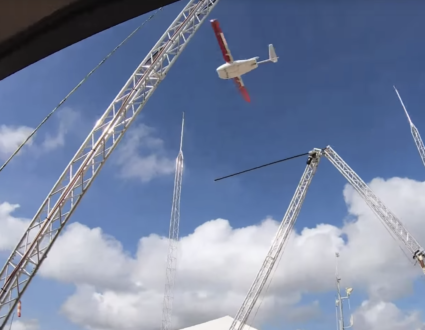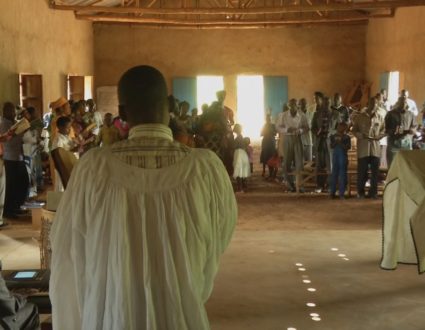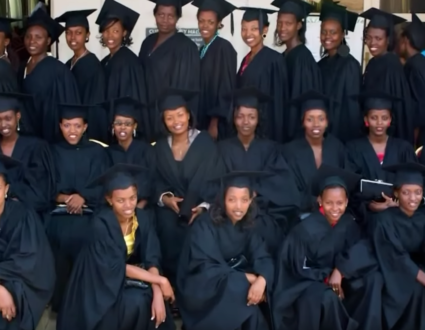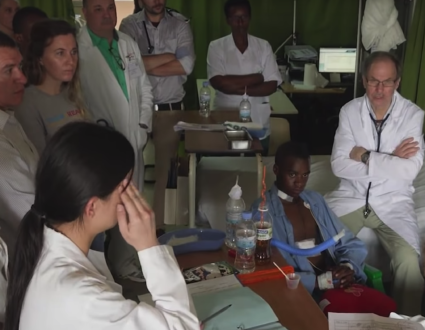- Amna Nawaz:This month, Rwanda is holding observances to commemorate the 30th anniversary of the genocide in that East African nation, a 100-day killing spree that took one million lives.Rwanda has won praise for its rebuilding efforts. But democratic backsliding and conflict just outside Rwanda’s borders have raised concerns over the country’s future stability and fear among survivors of the genocide.Fred De Sam Lazaro has our report.
- And a caution:The story includes language and images of extreme violence.
- Fred De Sam Lazaro:The memories from 30 years ago, it seems, will never become distant, the horrors lurking just below the surface, in some places, literally.Theodat Siboyintore brought me to this plot of land in Ngoma, about three hours from Rwanda’s capital, Kigali. It’s yet another saturated crime scene from which volunteers began removing human remains late last year. They are not done.
- Theodat Siboyintore, Genocide Survivor:Here, there was a heavy roadblock.
- Fred De Sam Lazaro:So, there was a roadblock just here?
- Theodat Siboyintore:Yes.
- Fred De Sam Lazaro:And people were slaughtered and buried here?
- Theodat Siboyintore:Exactly.
- Fred De Sam Lazaro:He belongs to a local group of survivors of what’s officially called the genocide against the Tutsi.The survivors group estimates that in just the last five years, up to 100,000 remains have been uncovered in mass graves. This one in Ngoma is among the more recent, the body count here about 1,000 and counting.Like others in the group, Siboyintore, 14 at the time, somehow managed to evade the murderous mobs, along with one sister. But amid the panicked, terrified crowds, they were separated from their parents and five other siblings, none of whom survived.Have you been able to locate where they are buried?
- Theodat Siboyintore:Not.
- Fred De Sam Lazaro:I’m sorry.I can never fathom what you went through. How do you keep from being angry?
- Theodat Siboyintore:Because, in Rwanda, we have rules.
- Fred De Sam Lazaro:Rules?
- Theodat Siboyintore:Rules. So, we can’t. And that is the spirit from our president.
- Fred De Sam Lazaro:President Paul Kagame, he says, has exhorted Rwandans to look forward, not back. Kagame looms large over every aspect of Rwandan life.In 1994, he led a force of exiles called the Rwandan Patriotic Front, or RPF, that defeated the genocidal regime, driving perpetrators from the rival Hutu tribe across the border into what is now the Democratic Republic of Congo. Hutus and Tutsis share the same culture, but under Belgian colonial rule, the wealthier Tutsis received preferential treatment in education and jobs.This 14 percent minority elite grew to be resented. And after independence in 1962 brought a Hutu-dominated government, many Tutsis, including Kagame’s family, fled into exile.Years of periodic upheaval ensued. Then, in 1994, amid peace talks, a plane crash killed the country’s Hutu president, and hell came to Rwanda.Scott Straus, University of California, Berkeley: You had a civil war, and you had a genocide, which devastated the country. The RPF leadership took over. They had a vision, and they have implemented that vision.
- Fred De Sam Lazaro:University of California Professor Scott Straus has written extensively about Rwanda.
- Scott Straus:Much of that is pretty — is amazing. Let’s lead people to change the way they think about who they are. They should invest in development. They should forget about Hutu and Tutsi. They should think about themselves as Rwandan.
- Fred De Sam Lazaro:The RPF banned the designation Hutu and Tutsi, instituting a combination of restorative justice and reconciliation efforts.Economic growth has been robust, and social welfare indicators have improved markedly in literacy, public health and female participation in government and the economy.
- Scott Straus:I think the flip side for Kagame and for the leadership around Kagame, is that, effectively, it’s a dictatorship.
- Fred De Sam Lazaro:Kagame won praise globally for bringing stability and development to a desperate nation, but he has increasingly ruled with an iron hand…Paul Kagame, Republic of Rwanda President: You value national unity.
- Lisa Desjardins:… amending the Constitution to extend his tenure and cracking down hard on journalists and political opponents.
- Scott Straus:The critics are run out of town or, in some cases — in some cases, assassinated. This is not a democracy story.
- Fred De Sam Lazaro:And Rwanda has been accused of stirring instability in the neighboring Democratic Republic of Congo, its forces fighting exiled Hutu rebel groups and supporting the notorious M23 militia, which the U.S. government has condemned for atrocities, including widespread rape and murder of civilians.
- Scott Straus:The RPF and Kagame, they came to power through rebellion by invading from Uganda. But their primary purpose is to secure the sort of zone around the country, so that there could be no insurgency or rebellion that is going to invade from Congo or from a neighboring country that could destabilize Rwanda.At some point in time, there’s going to be a transition in Rwanda. Historically, transitions in Rwanda have been very violent. I think the concern is that the resentment that we can’t see right now will also be violent.
- Odette Mukadata, Genocide Survivor (through interpreter):They’re planning to come again and finish what they didn’t finish in Rwanda, the genocide.
- Fred De Sam Lazaro:Among survivors living near the Ngoma mass grave, there’s constant fear of the Hutu groups living next door in Congo, of perpetrators with unsettled scores.
- Julienne Mukandiye, Genocide Survivor (through interpreter):We remember the genocide every single day, not only when we discover bodies. It’s an everyday process.
- Amanda Akaliza, Humeka:The toxic part — the most toxic part of it is that it continues for generations.
- Fred De Sam Lazaro:Amanda Akaliza, like most Rwandans today, was born after 1994. But she says they have inherited the post-traumatic stress, with little guidance on how to deal with it.
- Amanda Akaliza:If I look back right now, my college years, I felt like I was constantly outside of myself, right, because I always felt on high alert. It’s like a fire alarm going off in your system. But there’s no fire.Have you guys ever heard of social anxiety?
- Fred De Sam Lazaro:Having battled her own depression, she started an organization called Humeka to help young people grapple with their anxieties. There’s stigma attached to mental health issues,so they connect through socially comfortable activities, like this basketball camp.The long shadow of 1994 is inescapable, Akaliza says.
- Amanda Akaliza:If you go to the genocide memorial, and you see just how graphic it was, the heaviness of seeing children dying, you know, that’s the heaviness of seeing women being raped, your families being killed.We decided to forgive, and we decided to move on. But that thing still lingers. It’s a human, natural thing.
- Fred De Sam Lazaro:Everyone, it seems, is struggling to find closure. For survivors back in Ngoma, that can only come when more exiles return.
- Odette Mukadata (through interpreter):We have neighbors who have come back from Congo who live in harmony with no issue.
- Yvette Ivanova, Genocide Survivor (through interpreter):We deserve to have closure, and they deserve to have it for themselves.
- Fred De Sam Lazaro:They say it’s the exiled genocide perpetrators who can help bring closure. They, more than anyone, can locate the graves of hundreds of thousands of victims who remain unaccounted for, their survivors hoping to find a piece of clothing or personal effect that might bring a positive I.D.So far, Rwanda has reburied at least 400,000 victims at officially designated memorial sites across the country.For the “PBS NewsHour,” I’m Fred De Sam Lazaro in Ngoma, Rwanda.
- Amna Nawaz:Fred’s reporting is a partnership with the Under-Told Stories Project at the University of St. Thomas in Minnesota.
30 years ago
around 1 million people were killed in the genocide
Rwanda is holding observances to commemorate the 30th anniversary of the genocide in that East African nation that took one million lives. Rwanda has won praise for rebuilding efforts, but democratic backsliding and conflict just outside its borders have raised concern over the country’s future stability. Fred de Sam Lazaro reports. A warning, this story discusses and has imagery of genocide.

Around 100,000 human remains have been discovered in just the last five years
From 1994 to 2024
Most Rwandans today were born after 1994, but many of them still battle with intergenerational trauma from the genocide
Amanda Akaliza
“If you go to the genocide memorial, and you see just how graphic it was, the heaviness of seeing children dying, you know, that’s the heaviness of seeing women being raped, your families being killed.
We decided to forgive, and we decided to move on. But that thing still lingers. It’s a human, natural thing.”
We decided to forgive, and we decided to move on. But that thing still lingers. It’s a human, natural thing.”





